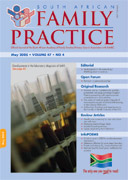Die voorkoms en profiel van pasiënte wat by ’n plattelandse praktyk presenteer met psigosomatiese klagtes.
Abstract
The prevalence and profile of patients presenting with psychosomatic complaints at a rural practice. Introduction: The general practitioner is often consulted by patients with complaints in which psychological factors have a significant influence on the origin, continuation or course of a disease. It is important to identify the condition as a psychosomatic disorder, since the patient can be treated more effectively if he or she gains insight into the underlying problem and the causal factor can be addressed. The aim of this study was to determine the prevalence of psychosomatic complaints in patients visiting a general practice. It was also investigated whether variables such as gender, age and population group play a role with regard to the prevalence of the complaints. In addition, it was determined which types of complaints and stressors occur. Methods: The sample for this cross-sectional study consisted of all patients who visited the two general practitioners in a rural practice in the Northern Cape during a six-week period. Results: Of the 466 patients seen, 78 (16.7%; 95% CI 13.3% to 20.1%) presented with psychosomatic complaints. There were no significant differences between genders or population groups. In patients with psychosomatic complaints the digestive system was themost common organ system with complaints and the greatest stressor wasthe family. Discussion: The study indicates that a significant percentage of patients present with a psychosomatic complaint and insight into the causal stressors. The study thus confirms the importance of a holistic and preventative approach to patient care in a general practice. (SA Fam Pract 2005;47(4): 51-53)
Published
2005-05-01
Issue
Section
Original Research
By submitting manuscripts to SAFP, authors of original articles are assigning copyright to the South African Academy of Family Physicians. Copyright of review articles are assigned to the Publisher, Medpharm Publications (Pty) Ltd, unless otherwise specified. Authors may use their own work after publication without written permission, provided they acknowledge the original source. Individuals and academic institutions may freely copy and distribute articles published in SAFP for educational and research purposes without obtaining permission.

